| Srl | Item |
| 1 |
ID:
156519
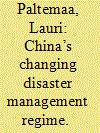

|
|
|
|
|
| Summary/Abstract |
This article analyses China’s disaster management regime at the local level. The article outlines historic disaster management regimes from the pre-imperial era to the present and ends with an analysis of the ongoing campaign for ‘comprehensive disaster relief model communities’. As argued in the article, throughout history Chinese disaster management has been characterized by attempts to combine strong state leadership with active grass-roots participation in disaster prevention and relief work, and different historical circumstances have translated into different kinds of disaster governance regimes with strengths and weaknesses. The current situation is no exception. The current model community drive led by the party-state aims to establish local professional or semi-professional disaster management organizations in every urban community, but leaves the role of civic organizations vaguely defined. While the state’s commitment to local-level disaster management has its strengths, the current ambiguous conceptualization of the role of civil society actors leaves resources untapped.
|
|
|
|
|
|
|
|
|
|
|
|
|
|
|
|
| 2 |
ID:
080495
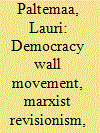

|
|
|
|
|
| Publication |
2007.
|
| Summary/Abstract |
This article analyses the Beijing Democracy Wall Movement's argumentation on democratic reforms in 1978-1981 from the perspective of the larger genre of international revisionist Marxism critical of Leninist/Stalinist political systems at the time of the movement. The movement's argumentation contained three distinct variations on the same theme of socialist democracy, which the author calls classical Marxist, eclectic Marxist and non-Marxist lines of argument. They differed in the content of proposed institutional reforms and their intellectual sources, but shared the perception of democracy as an institutional solution to the conflict between the people and a bureaucratic class that the Stalinist political system had produced in China. All lines also accepted the socialist economic system. As discussed in the article, these ideas were heavily influenced by the Radical Red Guard criticism against the Maoist New Establishment created and popularized during the Cultural Revolution, and the need to find ideological means to refute the official Maoist ideology of the Party Left at the time through a return to the original sources in Marxism. East-European revisionist Marxism also influenced these arguments directly and indirectly
|
|
|
|
|
|
|
|
|
|
|
|
|
|
|
|
| 3 |
ID:
077018


|
|
|
| 4 |
ID:
067260
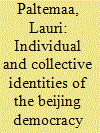

|
|
|
| 5 |
ID:
156518
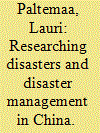

|
|
|
|
|
| Summary/Abstract |
This article offers an introduction to China Information’s special issue on disasters and disaster management. It is argued here that studying disasters and disaster management should not only improve our understanding of them as social phenomena and thereby increase our ability to manage disasters better, but also that disasters offer unique windows for researchers to study Chinese society and explain social and political changes therein. The article further argues that although research in natural disasters in China has developed rapidly both in terms of disciplinary approaches and topics, such research has still to overcome its narrow event-based nature and embrace more cross-disciplinary and comparative approaches geographically and historically, and disaster studies should investigate different types of disasters.
|
|
|
|
|
|
|
|
|
|
|
|
|
|
|
|
| 6 |
ID:
140295
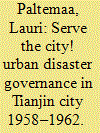

|
|
|
|
|
| Summary/Abstract |
Using new archival materials, internal publications, and gazetteers as its sources, this article studies the conduct of disaster governance in Tianjin city during the Great Leap Forward famine from 1958–1962. The city was organizationally well able to implement disaster relief efforts, and early on it took a number of measures to control and mitigate the food crisis that began in the city in early 1959. However, Maoist campaign-based disaster management could not work well when other campaigns were prioritized in its stead. Lacking central sanction for a major disaster relief effort, city leaders resorted to strategies that prioritized its residents over suburban peasants and outsiders. The city actively sought resources from outside while trying to prevent their outward flows. The city's own production of vegetables must not be overlooked as one of the reasons for better survival rates among urban residents, but even this policy was hampered by other Great Leap Forward initiatives. In the case of Tianjin, urban disaster governance of the famine was inward-looking and, at the same time, constrained and reliant on the central government.
|
|
|
|
|
|
|
|
|
|
|
|
|
|
|
|